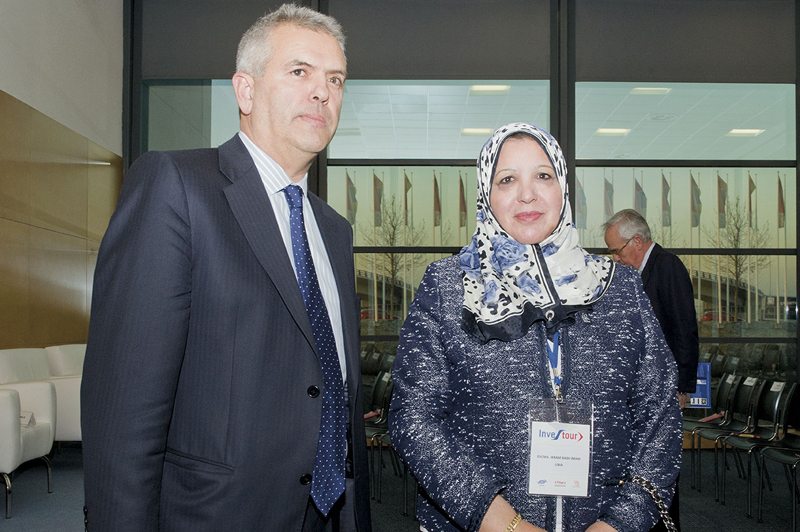Reviving Tourism in the Middle East and North Africa
The Libyan Tourism Minister, Ikram Bash Imam, invited Spanish companies to take part in re-launching the Libyan tourism industry during this event organized by Casa Árabe and the World Tourism Organization (UNWTO) at FITUR 2013.
February 08, 2013

Ikram Bash Imam, the Libyan Minister of Tourism, and Eduardo López Busquets, Director General of Casa Árabe, at FITUR 2013.
These statements were made on January 31 during the day devoted to analyzing the current situation and future prospects of tourism in Arab countries. At the round table talks held, the action being taken by these countries to promote their tourist activity was presented, and there was debate over the different possible strategies for reactivating the industry during the period after the uprisings by Arab peoples.
The event was backed by the attendance of many representatives from the UNWTO, the private sector and the diplomatic community. It began with words of welcome, which included the participation of Talib Rifai, Secretary General of the UNWTO; Eduardo López Busquets, Director General of Casa Árabe; Manuel Butler, Director General of Turespaña, and Ignacio Ybánez Rubio, Director General for the Maghreb, Africa, Mediterranean and Middle East, of the Spanish Ministry of Foreign Affairs and Cooperation.
Transitions, Proximity and Synergies
Rifai emphasized that destinations like Egypt and Tunisia, despite the disruption in 2011, saw a comeback in 2012 and have the ability to recover quite easily. In 2013, tourism may grow by 0-5%, and the long-term forecasts remain optimistic, provided there is peace and stability in the region. This is demonstrated by the expansion plans for airports, airlines and hotels. As we approach 2030, the MENA region is expected to receive approximately 195 million tourists, more than twice the current figure of 71 million, especially in traditional destinations such as Tunisia and Egypt, but also in new places like Libya.
As for López Busquets, he highlighted the resources which tourism can produce to help develop economic strength and ensure the stability of Arab nations. Likewise, he talked about the synergies between Spain and the MENA region which must be taken advantage of. This will be translated into a “win-win” situation, in which Casa Árabe envisions intense and diverse relations between the two shores of the Mediterranean Sea.
Butler spoke about the two main features of tourism: on the one hand, it brings together nearby neighboring peoples through peace and communication; on the other, it is a key vector of economic development and a very crisis-resistant industry. To provide one example, he explained that in 2012 there was nearly 3% growth in tourism in Spain, contributing some relief to the Spanish debt.
Last of all, Ybánez Rubio underlined the chance created by the Arab Spring to bring the Spanish and Arab people closer together with a focus on the shared values of democracy. In this sense, Spain may offer a part of its experience to help in the democratic transition, while he also emphasized dialogue, compromise and economic potential as fundamental factors in achieving a successful transition.
Opportunities and New Strategies
The first panel, titled The current situation and future prospects of tourism in Arab countries, was supported by the distinguished presence of Ikram Bash Imam, Libya’s Minister of Tourism; Amr el Ezabi, advisor to the Egyptian Tourism Minister, Abdelrazzaq Arabiyat, Director General of the Jordan Tourism Board, and Habib Ammar, Director General of the National Tourism Office of Tunisia. It was moderated by Amr Abdel-Ghaffar, the UNWTO’s Regional Director for the Middle East. The round table discussion highlighted the great potential for tourism in the new Libya and the other three countries’ capacity for staying the course and adapting.
Here you can see Casa Árabe’s interviews with the first three speakers (in English).
Interview to Ikram Bash Imam
Interview to Abderrazaq Arabiyat
Interview to Amar el Ezabi
The second panel, “Alternative strategies for reviving the industry from a business perspective,” included participation by Manuel Panadero, Director of Institutional Relations of Globalia; José Canals, Regional Director of the Barceló Group for the Balearic Islands and Mediterranean; Fernando Suárez de Góngora, Regional Director of Emirates Airlines for Spain and Portugal, and Felipe González Abad, an advanced consultant for Amadeus and the UNWTO. The panel was moderated by Eulogio Bordas, President, THR, Tourism, Hotel and Recreation Consultants; Manuel Panadero, Director of Institutional Relations of Globalia, and José Luis Zoreda, Executive Vice-President of Exceltur.
Further information on the contents of this seminar can be found in Economics and Business Newsletter number 34, which will provide an analysis of the most interesting topics discussed at this round table discussion, including an interview with José Luis Zoreda.

